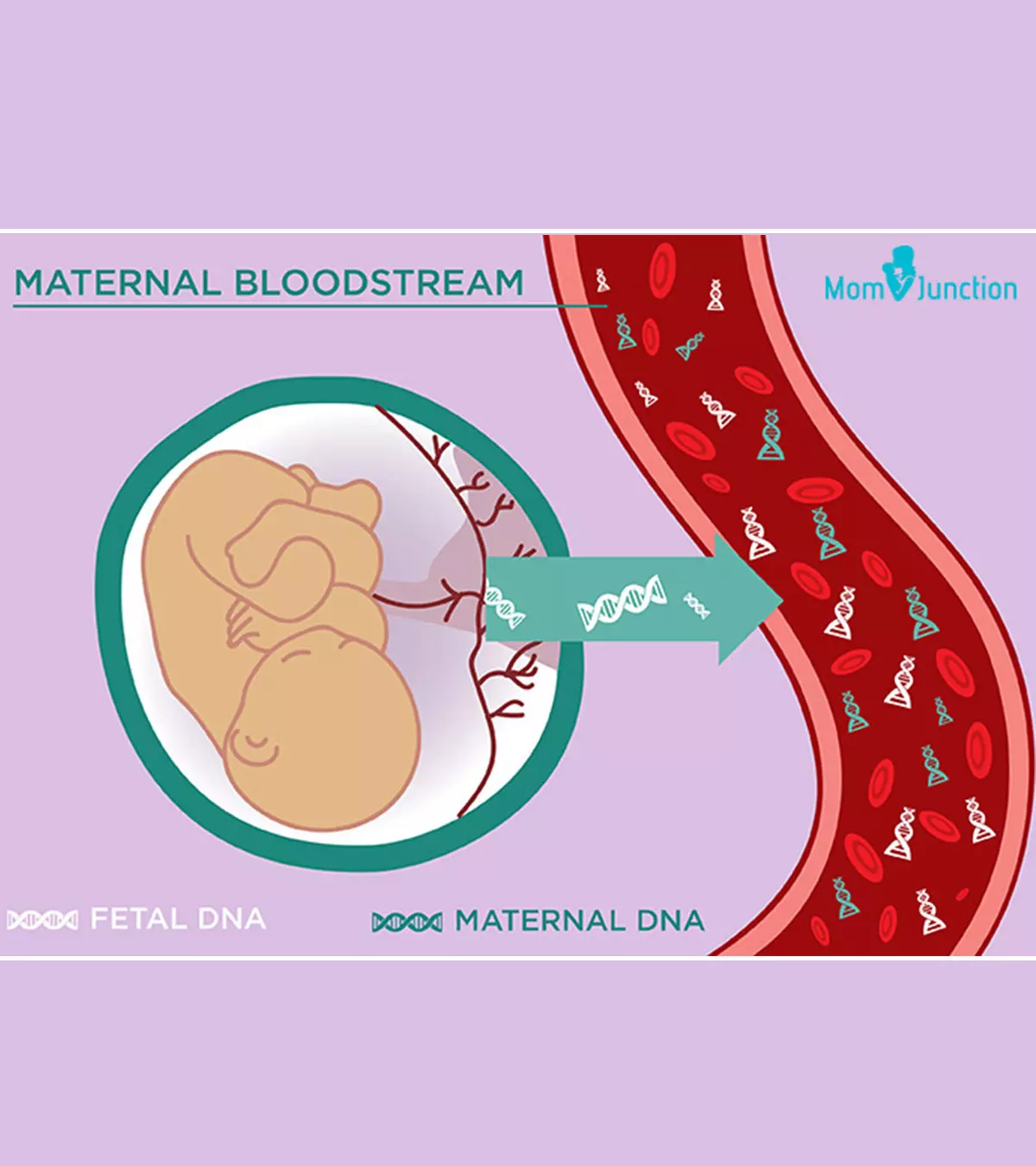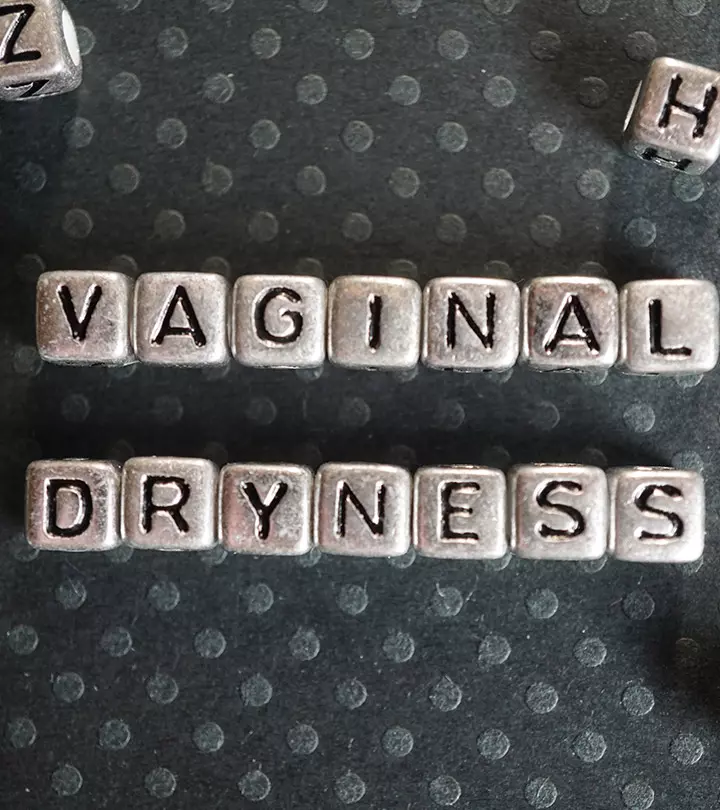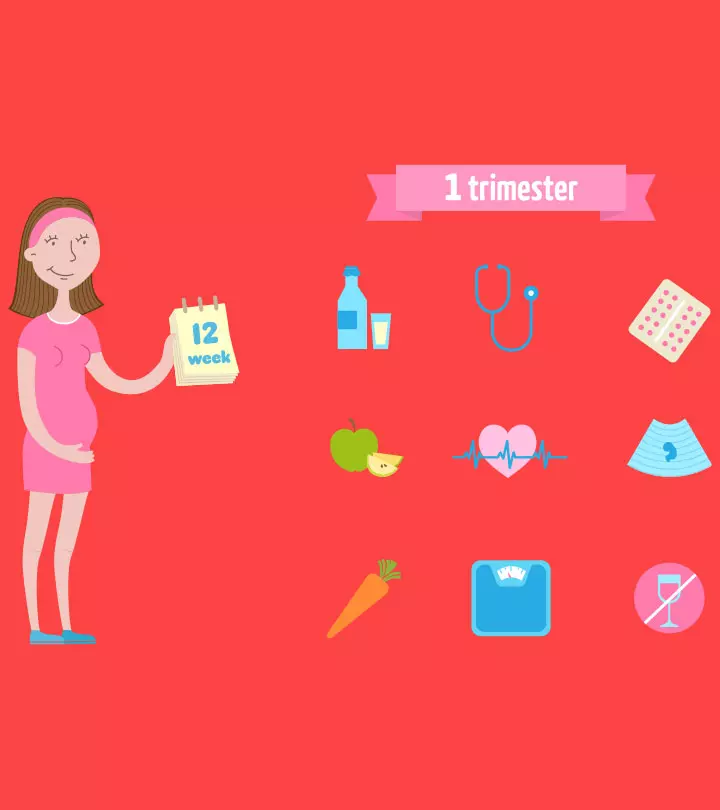
Image: Momjunction Design Team
NIPT test or noninvasive prenatal testing is a blood test to check the health condition of the unborn baby.
The blood samples collected from the mother’s arm contain small fragments of the baby’s DNA. Analysis of that DNA from the maternal blood may help identify the risk of chromosomal anomalies. Doctors may order specific tests based on these blood test results. Read on to know its importance, how it is done, its benefits, and the NIPT test results.
Key Pointers
- NIPT analyzes fetus’ DNA in mother’s blood to screen for chromosomal abnormalities.
- The test can be performed as early as ten weeks of pregnancy and has a 90-99% accuracy rate.
- Women over 35 or with a history of chromosomal abnormalities are typically advised to take the test.
- If the result is positive, the doctor may recommend additional tests and genetic counseling.
- NIPT can be costly and may not be effective for women with high BMIs and multiple pregnancies.
What is NIPT?
NIPT is a prenatal blood test to screen for fetal aneuploidy disordersiGenetic disorders diagnosed with either an extra or missing chromosome. such as extra copy of chromosome 21, resulting in intellectual impairment and short stature.i”Down (trisomy 21), Edwards Syndromei
(trisomy 18) and Patau syndromeiA genetic disorder (trisomy 13) characterized by poor life expectancy. (trisomy 13) that cause intellectual disability or significant birth defects.The test is also referred to as cell-free DNA screening, informaSeq, MaterniT21, Harmony, Panorama or Verifi. It screens for conditions that occur due to chromosomal abnormalities.
NIPT is a screening test and not a diagnostic test, which means it does not confirm if your unborn baby has a chromosomal condition. A normal NIPT result does not guarantee a healthy baby, and an abnormal result does not always mean the baby has a specific condition. In the case of an abnormal result, the doctor would suggest further testing.
Chorionic villus sampling (CVS) and amniocentesisiProcedure used to diagnose a fetus's chromosomal abnormalities, genetic disorders as well as gender determination. are the only two invasive procedures available for detecting Down syndrome and other chromosomal abnormalities (1).
 Quick fact
Quick factWho Goes Through An NIPT?
NIPT is recommended if:
- You are aged 35 or more
- Your BMI is 30 or more
- You previously had a baby with chromosomal abnormality
- There is a family history of chromosomal conditions
- Ultrasound or other prenatal tests have detected a problem
- You have a history of high-risk pregnancies
But, this is not a test of choice if there are:
- Fetal anomalies in the pregnancy ultrasound
- Known genetic anomalies
Also, this test is not recommended if –
- You are carrying twins or multiples
- You had a blood transfusion, stem cell transplantation or immunotherapyiA type of treatment that uses a person’s immune system to treat certain diseases, such as cancer. for over three months, or if you are undergoing a heparin therapy
- You are having genetic abnormalities (2)
When Is NIPT Done?
It can be done as early as ten weeks into gestation, which is earlier than any other prenatal screening or diagnostic tests. You will receive the results in a week or two.
How Is The Test Done?
The invasive procedure involves drawing blood, which is then sent to the laboratory for analysis. The lab technician looks at the cell-free DNA (cfDNA), the baby’s DNA fragments in the mother’s blood, for signs of abnormality.
Your healthcare practitioner will pair the results of the test with other findings from the first-trimester ultrasound scan and nuchal translucency scan for further diagnosis.
What Are The Possible Results Of NIPT?
While NIPT demonstrates high sensitivity and specificity for T21 and T18, there is still a possibility of missed or false diagnosis.
Low or negative risk means that it is unlikely your child is at a risk of the condition that NIPT screens for.
High or positive risk indicates that there is an increased risk of a particular condition. Your doctor recommends genetic counseling and further diagnostic testing.
Inconclusive or unclear results is a rare occurrence. It is also referred to as No Result NIPT or “Redraw Request”, and means that the outcome is inconclusive or not reportable. It usually happens when the test is done very early, i.e., much before ten weeks, and if the mom-to-be is obese. Make sure to talk to your healthcare provider about these results and plan the next steps together.
NIPT may also not yield a conclusive result in the case of:

- a lack of fetal DNA
- technical errors in the laboratory
- differences in the maternal blood sample
In this case, your doctor will recommend a re-test, or diagnostic testing along with genetic counseling (3). Genetic counseling provides the support patients need to explore their options, understand the outcomes, and make informed decisions about additional testing and pregnancy care.
False positive and false negative results are also possible. Therefore, the result can be low or negative risk, but a baby could be born with an abnormality. Likewise, the result may be high or positive risk, but a baby may not carry any abnormality.
A study conducted in an academic healthcare system in the US examined the acceptance and effectiveness of NIPT in managing high-risk pregnancies. The study identified 5,660 new high-risk pregnancies involving older mothers between 2012 and 2018.
The accompanying graph shows a significant rise in high-risk pregnancies associated with advanced maternal age. Furthermore, the number of NIPT tests ordered surged seven-fold from 2015 to 2018. Overall, the graph highlights that the rate of NIPT usage increased at a greater pace than the rise in the number of high-risk pregnancies due to advanced maternal age.

Longitudinal patterns of high-risk pregnancies with advanced maternal age (≥35 years)
Source: Non- invasive prenatal testing in mitigating concerns from invasive prenatal diagnostic testing: retrospective assessment of utility in an academic healthcare system in the US; BMJ Publishing Group Quick fact
Quick factHow Accurate Is NIPT?
NIPT is more accurate than the traditional first-trimester blood screenings (such as blood work or quad screening). The test is 90 to 99% accurate with false positive rates of less than 1%. It means there is a very less chance that your practitioner would recommend follow-up tests such as CVS or amniocentesis test (3).
Thus the test is beneficial because it helps know about the likely abnormalities in the baby.
What Are The Benefits Of NIPT?
Here are some ways NIPT could be good for the baby:
- The early prenatal testing helps you decide about the future course of action if the fetus is diagnosed with abnormalities.
- High accuracy rate of up to 99%. Eliminates the need for further diagnostic tests in most cases.
- Detects chromosomal sex conditions such as Klinefelter syndrome (47, XXY) and Turner syndrome (45, X), but with lesser accuracy.

However, non-invasive prenatal testing also has certain limitations.
Drawbacks of NIPT
Let’s see what they are:
- Detects only a limited number of conditions
- There is always a risk of false-positive results, and a trained professional is needed for interpreting the results accurately.
- It will not work if you have a high BMI or are expecting multiples (5).
- Expensive since many insurance companies cover it only for women over 35 years
How Much Does NIPT Cost?
The prices might vary. The cost of NIPT ranges between $800 and $2000 in the US, and between $500 and $1500 elsewhere (6). Most insurance companies cover only a portion of the cost. We advise you to check with your insurance company about its coverage.
Frequently Asked Questions
1. Does the NIPT test tell the baby’s gender?
Non-invasive prenatal testing (NIPT) may be able to accurately determine the baby’s gender when conducted after the seventh week of pregnancy (7).
2. Is the NIPT test mandatory?
The test is not mandatory. Nevertheless, the American College of Obstetricians and Gynecologists (ACOG) recommends that every woman be well-informed and offered NIPT, irrespective of the pregnancy risk category and maternal age (8).
3. Can a NIPT test determine the father?
No, non-invasive prenatal testing (NIPT) is mainly employed for screening fetal chromosomal abnormalities, like Down syndrome in babies before birth. It does not establish paternity.
4. Why hasn’t the FDA approved NIPT?
NIPT (Non-Invasive Prenatal Testing) lacks FDA approval as it is yet to undergo its review. The FDA cautions against false results, improper usage, and misinterpreting NIPT tests. They advise patients to consult healthcare providers for accurate comprehension and informed decision-making (9).
5. Does maternal age affect NIPT results?
Maternal age might affect fetal fraction, a vital factor in noninvasive prenatal screening that examines cell-free fetal DNA in maternal plasma. Nevertheless, there is no widespread agreement on the precise factors impacting fetal fraction or the methods employed to assess it (10).
6. What is the difference between NIPT and genetic testing?
NIPT examines fetal DNA in maternal blood to detect chromosome conditions during pregnancy. In contrast, genetic screening assesses inherited genetic conditions in adults that may be transmitted to their offspring. NIPT is specific to prenatal screening, whereas genetic screening occurs pre-conception or in early pregnancy (11).
7. Are there any risks associated with NIPT?
No, NIPT tests are safe and do not pose any risk to the fetus. The procedure only involves drawing blood from the pregnant person, completely eliminating any potential dangers to the unborn child (4).
8. How long does it take to receive NIPT results?
NIPT test results can take up to two weeks but often arrive earlier. Healthcare providers receive the results first and subsequently inform the patient about them (4).
9. How often can NIPT be done during pregnancy?
NIPT can typically be done once during pregnancy, usually around 10 to 13 weeks gestation. It is not a recurring test and is commonly performed as a non-invasive screening option for certain chromosomal abnormalities. However, specific recommendations may vary, so it is advisable to consult with a healthcare provider for personalized information (4).
10. How is NIPT different from diagnostic tests, such as amniocentesis or chorionic villus sampling?
Non-invasive prenatal testing (NIPT) screens fetal DNA in the mother’s blood to evaluate the risk of specific genetic conditions. It’s safer, non-invasive, and can be performed earlier in pregnancy than diagnostic tests such as amniocentesis or chorionic villus sampling, which have a slight miscarriage risk (4) (12).
Infographic: Indications For Recommending NIPT During Pregnancy
NIPT is a screening test that can be done as early as ten weeks of gestation. The test uses prenatal blood samples to screen for fetal disorders. But not every pregnant woman needs to go through this test. The infographic below provides criteria for when a pregnant woman is recommended for a NIPT test.

Illustration: Momjunction Design Team
Noninvasive prenatal testing or NIPT test is a highly sensitive blood test to identify Down syndrome and other genetic abnormalities in unborn babies. Small fragments of fetal DNA circulating in the maternal blood determine the risk for genetic anomalies. This test can be done as early as ten weeks of pregnancy, and there is no harm to the fetus. If the result is positive on this screening test, diagnostic testing is needed to confirm the abnormality. Chorionic villus samplingiA prenatal diagnostic test to determine chromosomal or genetic disorders. (CVS) or amniocentesis is further recommended to confirm the condition.
NIPT is a non-invasive prenatal test that can detect genetic conditions in a fetus. Learn when to take this test, the process, and more in this descriptive video!
Have you undergone an NIPT? Let us know your experience in the comments section below.
References
- Megan Allyse et al.; Non-invasive prenatal testing: a review of international implementation and challenges; (2015)
https://www.ncbi.nlm.nih.gov/pmc/articles/PMC4303457/ - Non-invasive Prenatal Screening: The Clinical Perspective
https://www.cdc.gov/cliac/docs/addenda/cliac1115/10_Bellcross_Genetics_NIPS_CLIAC_Nov2015.pdf - Non-invasive Prenatal Testing Result
https://mydoctor.kaiserpermanente.org/ncal/Images/GEN_NIPT_NoResult_tcm63-1125048.pdf - NIPT Test
https://my.clevelandclinic.org/health/diagnostics/21050-nipt-test - Megan Allyse et al.; Non-invasive prenatal testing: a review of international implementation and challenges
https://www.ncbi.nlm.nih.gov/pmc/articles/PMC4303457/ - Non-invasive Prenatal Testing: A Review of the Cost Effectiveness and Guidelines
https://www.ncbi.nlm.nih.gov/books/NBK274056/ - Hilary Bowman-Smart et al.; Sex selection and non-invasive prenatal testing: A review of current practices evidence and ethical issues
https://obgyn.onlinelibrary.wiley.com/doi/10.1002/pd.5555#:~:text=Non%2Dinvasive%20prenatal%20testing%20(NIPTand%20very%20early%20in%20gestation. - Non-Invasive Prenatal Testing
https://www.acog.org/advocacy/policy-priorities/non-invasive-prenatal-testing - Genetic Non-Invasive Prenatal Screening Tests May Have False Results.
https://www.geneticsandsociety.org/article/genetic-non-invasive-prenatal-screening-tests-may-have-false-results-fda-safety - Cechuan Deng et al.; Factors Affecting the Fetal Fraction in Noninvasive Prenatal Screening: A Review – PMC
https://www.ncbi.nlm.nih.gov/pmc/articles/PMC8829468/ - First Trimester Screening, Nuchal Translucency and NIPT
https://www.hopkinsmedicine.org/health/treatment-tests-and-therapies/first-trimester-screening-nuchal-translucency-and-nipt - Chorionic Villus Sampling and Amniocentesis: Recommendations for Prenatal Counseling
https://www.cdc.gov/mmwr/preview/mmwrhtml/00038393.htm
Community Experiences
Join the conversation and become a part of our nurturing community! Share your stories, experiences, and insights to connect with fellow parents.
Read full bio of Dr. Asmita Kaundal
Read full bio of Rebecca Malachi
Read full bio of Dr. Ritika Shah
Read full bio of Reshmi Das
















